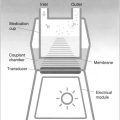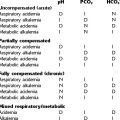CHAPTER 14 RESPIRATORY MEDICATIONS
PRETEST QUESTIONS
1. With which of the following lung disorders would acetylcysteine (Mucomyst) be indicated?
2. A patient with glottic edema after extubation is in mild respiratory distress. Which of the following medications would be of benefit in this situation?
3. You are having difficulty intubating a combative patient in the emergency department. The respiratory therapist should recommend the delivery of which drug to facilitate intubation?
4. Which of the following airway disorders may be successfully treated with dexamethasone (Decadron)?
REVIEW
I. CLASSIFICATION OF RESPIRATORY MEDICATIONS
CRT Exam Content Matrix: IIIC3,IIID5a, IIIF2h4, IIIG2b, IIIG4a,b,c,e-k
RRT Exam Content Matrix: IIIC3, IIID5a, IIIG2b, IIIG4b-h
![]() Exam Note
Exam Note
These medications stimulate one or more of the following adrenergic receptors.
| Receptor | Location | Response |
|---|---|---|
| Alpha | Mucosal blood vessels, bronchial smooth muscle | Vasoconstriction, bronchoconstriction |
| Beta1 | Heart muscle | Increased heart rate and cardiac output, arrhythmias |
| Beta2 | Bronchial smooth muscle, peripheral mucosal blood vessels, CNS, and peripheral limb muscles | Bronchodilation, vasodilation, nervousness (CNS), tingling in fingers |
![]() Ipratropium bromide is faster acting, longer lasting, and exhibits fewer side effects than atropine.
Ipratropium bromide is faster acting, longer lasting, and exhibits fewer side effects than atropine.
CRT Exam Content Matrix: IIA22, IIID5b
RRT Exam Content Matrix: IIID5b
CRT Exam Content Matrix: IIIG4k
RRT Exam Content Matrix: IIIG4h
POSTCHAPTER STUDY QUESTIONS
1. What is the primary indication for acetylcysteine?
2. What is racemic epinephrine most commonly used for?
3. List four examples of sympathomimetic bronchodilators.
4. List two examples of parasympatholytic bronchodilators.
5. Which neuromuscular blocking agent is used primarily for short-term paralysis during a difficult intubation?
6. How does cromolyn sodium help in the treatment of asthma?
7. List five antibiotics that are aerosolized and the conditions for which they are indicated.
8. List three corticosteroids that are commonly aerosolized.
9. List the side effects of corticosteroid therapy.
10. List three leukotriene modifiers.
11. Leukotriene modifiers are administered for what purpose?
Bills G, Soderberg R. Principles of pharmacology for respiratory care, ed 2. Albany, NY: Delmar; 1998.
Oakes D. Clinical practitioner’s pocket guide to respiratory care, ed 5. Rockville, MD: Health Educator; 1996.
Rau J. Respiratory care pharmacology, ed 7. St Louis: Mosby; 2008.
Wilkins RL, Stoller JK, Kacmarek R. Egan’s fundamentals of respiratory care, ed 9. St Louis: Mosby; 2009.





